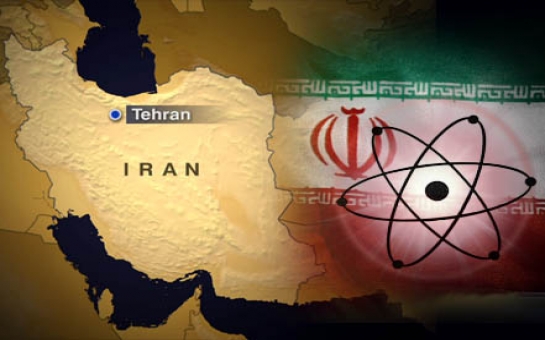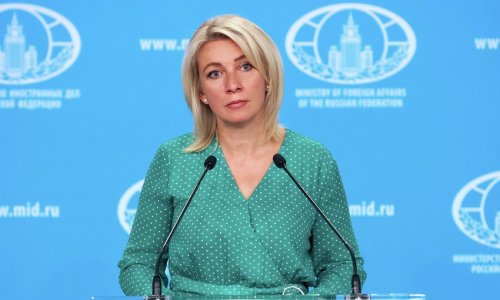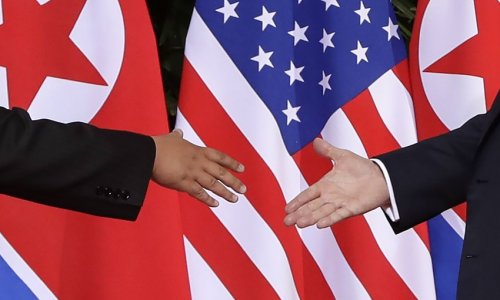Follow us !
5 reasons diverse critics oppose Iran nuclear deal
World
21:19 | 27.11.2013

5 reasons diverse critics oppose Iran nuclear deal
It is the first major international agreement on Iran's nuclear ambitions after a decade of failed efforts, and follows the first notable thaw in U.S-Iranian relations in 34 years.Iran reaches nuclear deal with world leaders -- now what?Then why are so many people at home and around the world so angry, or at least concerned, about the six-month deal reached over the weekend by negotiators in Geneva?The reasons are as numerous and complex as the diverse assortment of critics, including Israel and Arab powers who remain technically at war, as well as congressional Republicans and some leading Democrats.Lawmakers from both parties urge cautionGiven the topic -- U.S.-led efforts to prevent Iran from developing nuclear weapons -- and the players involved, controversy was inevitable over any deal from the Geneva talks involving Iran and the five permanent members of the U.N. Security Council as well as Germany.The agreement labeled "interim" eases some economic sanctions imposed on Iran while requiring Tehran to dilute its most highly enriched uranium needed to make nuclear weapons and halt other enrichment programs, all under international inspection.U.S. officials say the goal is to now negotiate a comprehensive deal that would dismantle Iran's ability to develop nuclear weapons, in return for lifting sanctions that have crippled the Iranian economy.Here are five reasons why opponents don't like what happened:1) It's IranThe breakthrough followed Iran's election this year of the relatively moderate President Hassan Rouhani, who pledged to end his nation's international isolation and the crushing sanctions.Steps so far included the first one-on-one conversation between an Iranian and U.S. president since 1979 when Rouhani and President Barack Obama spoke by phone in September. Other talks, some public and some private, led to the Geneva negotiations involving Iran and the P5+1 -- the United States, Great Britain, France, China and Russia along with Germany -- in recent weeks.However, some opponents just don't like Iran. The United States lists it as a state sponsor of terrorism and Iran is a sworn enemy of Israel that has repeatedly ignored U.N. demands for it to curtail nuclear development needed to build weapons of mass destruction.Obama phones Netanyahu to reaffirm 'shared goal' on IranNetanyahu: Iran nuclear deal 'historic mistake'"Iran is an enemy," former U.S. Sen. Joe Lieberman told CNN on Monday, adding that "there is American blood on Iranian hands" going back to the Beirut embassy bombing in 1983 by Hezbollah, the Iranian-backed Lebanese militant organization.Lieberman, who is a strong supporter of Israel and conservative on defense matters, also said the Iranians "have a terrible record of not keeping agreements and frankly of lying."Israeli Prime Minister Benjamin Netanyahu labeled the new agreement a "historic mistake" and said Monday that it "reduces the pressure on Iran without receiving anything tangible in return, and the Iranians who laughed all the way to the bank are themselves saying that this deal has saved them."Netanyahu also reiterated his commitment to preventing Iran from developing a nuclear weapon --which is diplomatic-speak for threatening a military attack on Iranian facilities if Israel believes Tehran can build such armaments.Tony Blinken, a U.S. deputy national security adviser, told CNN that "Israel is right to be skeptical.""An Iranian bomb would present an existential threat to Israel, and we have exactly the same goal, which is to prevent Iran from getting a bomb," Blinken said. "There may be tactical differences in how we get there."For his part, Obama defended the deal, responding to critics by saying "we cannot close the door on diplomacy.""Tough talk and bluster may be the easy thing to do politically, but it's not the right thing to do for our security," he said on Monday in San Francisco.2) Sanctioning sanctionsThe current array of international sanctions initially targeted Iran's nuclear capability. Over the past seven years, they expanded to include bans on arms sales, Iranian oil and certain financial institutions, including the country's central bank.As a result, oil revenues plummeted, inflation and layoffs spiraled and the local currency devalued.Under the new agreement, Iran can get $7 billion in immediate sanctions relief -- a small percentage of the scores of billions still frozen or inaccessible, but a valuable infusion that signified reward if not triumph for Rouhani's détente effort.Critics of the deal called any sanctions relief premature and poorly timed."Iran simply freezes its nuclear capabilities while we reduce the sanctions," Democratic Sen. Chuck Schumer of New York told reporters over the weekend. "That is not a proportionate agreement."Republican Sen. Lindsey Graham of North Carolina lamented that the deal let Iran off the hook after "we had the chance to deliver a body blow.""The sanctions actually worked but this interim deal gives the Iranian's $7 billion in cash and leaves in place one of the most sophisticated enrichment programs around," Graham told CNN.Graham and Schumer argued the interim deal should have included specific steps by Iran to dismantle its nuclear weapons technology, such as turning over its stockpile of heavily enriched uranium and getting rid of centrifuges needed for enrichment.Lieberman, meanwhile, called the interim deal a "mistake" and argued that the United States and its U.N. partners should have pushed for a comprehensive agreement now that eliminated Iran's capacity to try to develop a nuclear weapon.Instead, the signal to the world was to "start doing business with Iran again," Lieberman said, creating what he called a "new normal" that would be difficult to roll back if no comprehensive agreement gets reached.Blinken said that "if we could have gotten an entire freeze of their program right away in one fell swoop, of course, we would have done it.""But the Iranians were not prepared to go there. It would take a long time to negotiate that," he told CNN. "Indeed, that's what we're trying to get to. In the interim, what we didn't want to happen was for the Iranians to be talking to us and the rest of the international community and using the cover of talks to keep advancing their program. This shuts down the program for making progress. It rolls it back."In the meantime, he added, "we are not taking the sanctions away.""The existing sanctions will continue to be implemented," Blinken said. "And indeed, the amount of relief that Iran gets during the six-month period will be dwarfed by the sanctions that accumulate during this period. So the pressure on Iran is not going away. To the contrary, it's going to grow during the six months."Schumer and other members of Congress say they'll push for a new sanctions bill in coming weeks that would reinstate the eased measures under the new agreement if no comprehensive deal emerges in six months.Negotiator in chief: How John Kerry delivered the Iran dealThe Obama administration cautions against such a move, saying it could scuttle the Geneva negotiations. That means Obama could end up vetoing a sanctions measure pushed by both Republican foes and some top Democrats such as Schumer.3) It gives legitimacy to Iran's nuclear ambitionsIran insists its nuclear program is for peaceful use, such as power generation and medical technology. Few really believe that, given Iran's efforts to expand enrichment and other steps needed for nuclear weapons development.While the new interim agreement curbs enrichment as well as work on its heavy water reactor under development at Arak, critics complain it does nothing to dismantle current Iranian capabilities.A particular point of contention is Iran's insistence that it has a right under international agreements to enrich uranium for nuclear power production. The language of the interim agreement called for the issue to be settled in a final deal.To Graham, the message to Iran should be: "You're insisting on the right to enrich. Given your behavior, you've abandoned that right.""Once you get them to the table, you let them know what the final deal will look like and say take this or else," he told CNN.Ben Rhodes, the deputy national security adviser for strategic communications, said putting the uranium enrichment question off to a comprehensive agreement left it to negotiators to define what Iran will and won't be able to do."We get to decide whether Iran has dismantled its facilities, put in place sufficient constraints that we could accept a limited peaceful nuclear program in Iran," Rhodes told MSNBC. "But that is not something they can pocket now. That would have to be negotiated over the next six months. And, if we don't agree, they have no right to enrich, they're still in violation of the Security Council resolutions, and we're back to increasing pressure."4) It gives legitimacy to Iran as a major player in the Middle EastThe Sunni-Shiite rift in the Muslim world also comes into play regarding Iran's nuclear program and the new interim agreement.In particular, Sunni Arab powers such as Saudi Arabia oppose Iran's support for Shiite-affiliated terrorist groups and embattled Syrian President Bashar al-Assad's regime. They fear the outcome if Iran developed a nuclear weapon, and also know an end to oil sanctions on Iran means more competition for their exports.A Saudi Arabian official, who asked to not be named because he was not authorized to speak to the media, said the government continues to examine the deal closely with concern."Many in Saudi Arabia worry that Iran is not being sincere, and the worry during the negotiations was that any deal reached would mean Iran would widen their influence in the region -- in countries like Lebanon and Bahrain -- and become a bigger threat," the official said.Officially, the Saudi government and other Gulf Arab states expressed cautious optimism Monday that an agreement to curb Iran's nuclear weapons ambitions could remove the threat of nuclear weapons in the region.U.S. critics sounded a similar concern."I believe that the attitude should be mistrust and verify," said House Majority Leader Eric Cantor, who strongly supports Israel. "All we have to do is listen to our allies who are most proximate to the threat in the region -- Israel, the Gulf Arab allies that we have, who have been saying all along that any kind of deal with this regime and Iran is not worth the paper it's written on."Blinken told CNN that the Obama administration will continue to focus on other issues involving Iran that concern allies in the Middle East and elsewhere, whether or not a comprehensive nuclear deal gets worked out."Some of our Arab friends, for example are concerned that if we get a deal with Iran on its nuclear program, a comprehensive deal, then we'll be satisfied and forget about all the other things Iran does they don't like and we don't like," he said. "And the fact is we won't. We will continue to confront what Iran is doing around the world that is a problem for us and a problem for some of our partners."5) An enemy of Israel is my enemyU.S. politicians from states with influential Jewish constituencies face pressure to support Israel's position in opposing the interim Iran agreement.Administration tries to reassure American-Jewish groupsEven Democrats such as Schumer who have strong ties to Obama made clear that they shared Israel's concerns over the deal with Iran.They joined Republicans who traditionally back Israel as the strategic U.S. ally in the Middle East and a functioning democracy in the region.Iran should have to "irreversibly dismantle its nuclear stockpiles and not be allowed to continue enrichment," said Cantor, a Virginia Republican. "And I think this deal falls short on all of those fronts, and I think it bodes very, very ominously for the region, and in fact, U.S. security."Other Republicans seemed to reject the new agreement merely because Obama pushed for it, seeking as much political gain as possible from the TV bulletins and news headlines of the weekend.Conservative Sen. John Cornyn of Texas reacted within minutes of the announcement Saturday night with a Twitter post that accused the Obama administration of timing the agreement to divert the nation's focus from problems with his signature health care reforms."Amazing what WH will do to distract attention from O-care," Cornyn's tweet said in reference to the reforms known as Obamacare.Democratic Sen. Bill Nelson of Florida took Cornyn to task, calling the tweet "kind of silly" and adding: "that's coming from people that if the president is for something, they're against it."(CNN)ANN.Az










